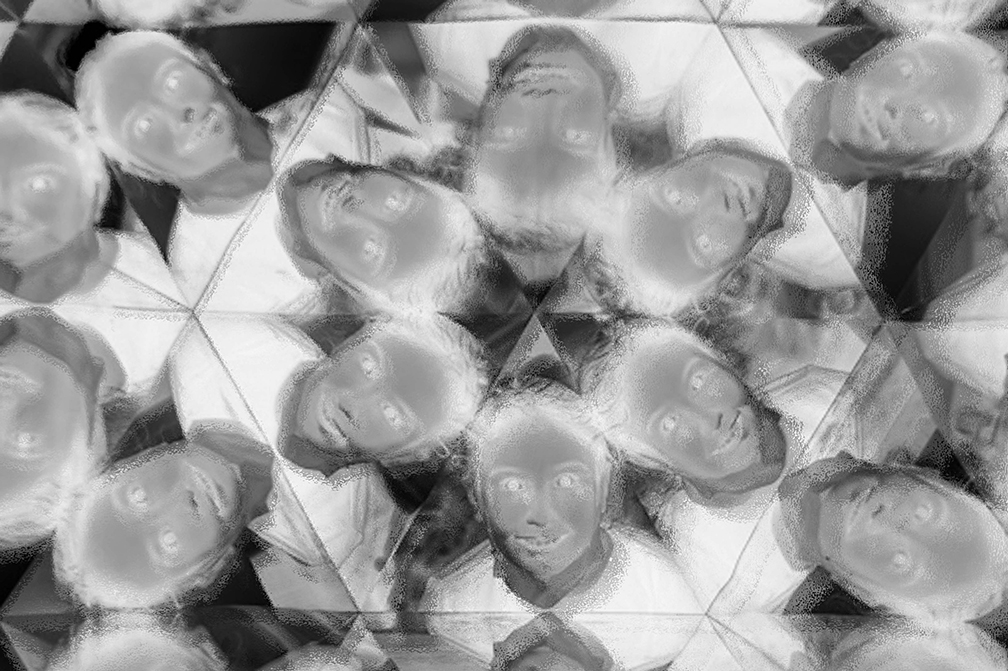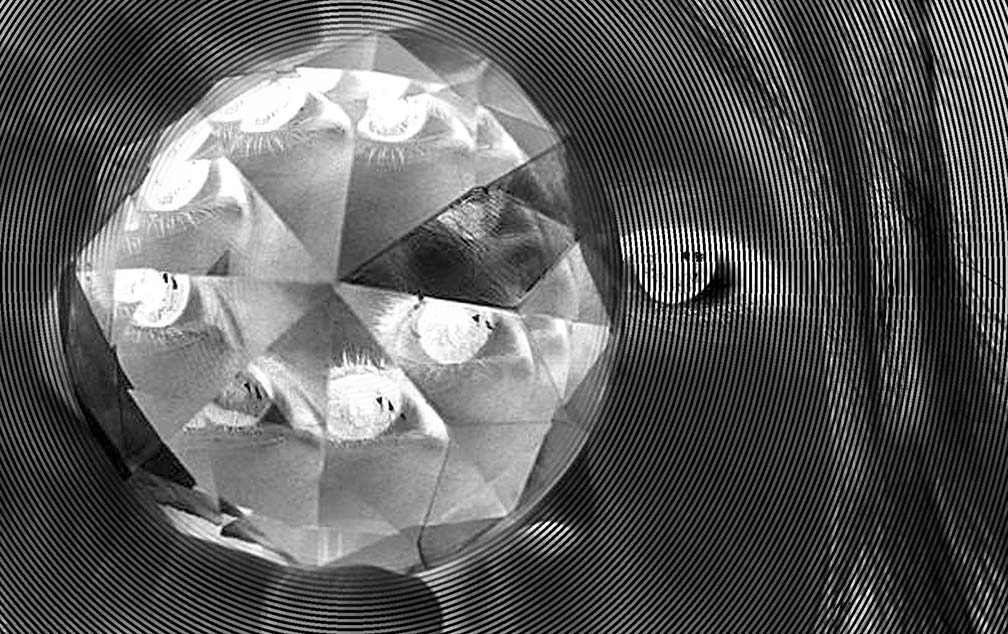She found it in a yard sale and her childhood came back in a rush. She remembered holding one to her eye until the classmate who owned it asked for it back, annoyed that she was spending an inordinately long time “borrowing” it.
Reluctantly, she had handed it over.
But just for a while there, it felt weird, like the swirl of colors waved, spun and started to grow indistinct.
And she had felt a sensation of being pulled in as if by a giant magnet.
She shuddered and shook her head to clear it. It’s only a kaleidoscope, she had to remind herself. Just an optic toy made of cardboard, loose bits of colored plastic, and two reflecting surfaces.
She used to think it could do magic until her brother brought home a broken one he found and they had taken it apart to see what was inside.
She wished now they had not done that because it meant the loss of part of its aura of mystery.
But she had always been curious and remembered her seventh birthday.
On the front of a gift was a 3D image of tropical fish, like in an uncle’s aquarium.
She later learned the illusion of depth and movement was made possible by something called lenticular technology.
She was similarly disappointed when she peeled off the glued-on image from the bag and found nothing behind it but ridged plastic that was the photo of the fishes arranged in interlaced strips or lenses.
There goes the magic, she’d thought, but on the contrary, it had stayed with her: this silly notion that she’d find moving and breathing seahorses, pufferfish, and other marine life back there.
Impressions you acquired in childhood always seem to stick with you.
Like the toy she now had in her hand that the woman asked very little for, practically gave it away.
She smiled her thanks and walked back to her car with it. It happened on the yard sale purely by accident while on her way home from the hospital.
She was driving absently while going over what the oncologist said: “I’m afraid it’s pancreatic cancer” and began rattling off her options from surgery to immunotherapy.
She had tuned out, told the doctor she wanted some time to think about it, then left.
She knew her diabetes was going to do her in sooner or later, she just didn’t expect it to be this soon.
She wasn’t quite sixty yet, was unmarried, lived with a cat, and with the entirety of her creative output consisting only of one book of poetry and two slim volumes of short stories, published – hadn’t felt like the rock star her writing circle made her out to be.
The book on her newsroom days her last editor offered to co-write with her when she retired at age 55, never quite materialized.
Whoever heard of a year-long writer’s block?
Way to go, gonzo, she chastised herself, how can you disappoint even you?
Suddenly, she didn’t feel like going home to an empty house. She had fed the cat before she left for the hospital, so she decided a cup of coffee in that charming corner tea room with the climbing wisteria was just what she needed.
After she’d settled down with her coffee and teacake, she raised her yard-sale find to one eye and then the other.
While rotating the cylinder, she could see that this one had real mirrors and colored glass that formed changing symmetrical patterns like cathedral panes.
Or the mandalas that she and her college friend Joan admired at a Buddhist temple when they traveled to Bhutan together.
Bhutan felt very much like the movie Lost Horizon to her. She read the James Hilton novel, of course, but it was a bit of a bore – not quite as mystical as the Shangri-La that one crossed over through a rock wall in the Himalayas that the movie imagined it to be.
And while lost in that thought, the patterns formed by the kaleidoscope suddenly went blurry and when she blinked, found herself transported back to – what was this place? – Bhutan?
It felt very familiar, almost like she was meant to be here.
The closest she could compare it with were the scenes that emerged when she closed her eyes at night and wasn’t quite ready for sleep yet – first a series of red dots rushing at her, phosphenes she read they were called – then dim lights suddenly becoming brighter to reveal a detail of what looked like wallpaper. No, more like the center pole of a moving carousel, because now she could hear calliope music as well. And a sensation of a slowly revolving movement.
She was on a wooden horse, on a merry-go-round! She almost fell off it when a hand reached out to steady her.
“Hey, I’ve got you,” a voice reassured her.
She turned her head and saw the man – also strangely familiar – moving alongside her.
“Is this making you dizzy?” he was trying to make himself heard over the carnival music, “do you want to get off?”
Then as suddenly as it began, the reverie was faded and she found the shopkeeper bending over her, “do you want a fresh cup? I do believe your coffee has gone cold.”
“Yes, please,” she had mumbled in embarrassment, while trying to regain her composure, “sorry about that.”
“It’s quite alright, my dear,“ the kindly lady said with a slow wink, “people really do come here to dream.”
After paying for her coffee, a lace throw blanket and some packets of flower seeds, she left, taking the scenic way home through the autumn trees.
Burning with curiosity as to whether the lapse that just happened was merely due to inattention resulting from the bad news about her health she’d just received, or the kaleidoscope on the seat beside her – she pulled up on the side of the road to find out.
Bringing up the toy to one eye, she watched the bits of glass begin to form
their patterns again.
Red dots swimming before her eyes. A pinprick of white light grew bigger until it revealed bits of mirrors and curved, teardrop shapes called paisleys in varied colors. And calliope music.
Someone was holding her.
She opened her eyes and it was that man again. “Hi,” he said quietly smiling down at her, “we lost you for a while.”
She stood up from the park bench where she had been leaning against him, “Where am I? Where is this?”
“Easy, “ he stretched out his arms as if to catch her, “you were out like a light just now.”
She did not know if she was awake or asleep. Nothing about this scene made any sense and she felt panic rising.
“You’re not in a dream state,“ he said firmly, as if he read her mind, “or a trance. You are really here. I sent for you.”
“What is this place? Why am I here?”
“I found a way for you to come back to me. You were meant to find the means to do it.”
Then he sat her down again and told
her everything:
that the kaleidoscope was placed where she was certain to find it. Its infinity patterns – the doorway she would traverse from her world to his;
that while the ever-changing color combinations the kaleidoscope forms are beautiful and symmetrical, the means it provides to get from the physical world to the mystical one – can be terrifying, fearful;
like life and death;
that is, if one did not fully understand that the next aspect of existence was just the other side of this one;
that this mystical realm felt familiar to her because she had visited it many times in recurring dreams that she’d forget about upon waking up;
… that in this realm, there is no pain, no sickness, no aging.
“It’s almost time for you to return. Permanently, I mean,“ is how he summed it all up and here he regretfully acknowledged his offense, “which is why I had to start easing you into it already.”
She shut her eyes momentarily to try and let what he said sink in, but that was all it took to transport her back behind the wheel of her car, freewheeling down a lonely country road, and right into the path of a barreling 18 wheeler that took an unexpected detour.
The paramedics got there too late. She was already gone. The head-on collision had been horrible.
But there was something the post-crash response team could not understand.
The victim – when they cut her loose from the mangled wreckage of her car
– was smiling.
Like she was enjoying a day at a
fair somewhere.



